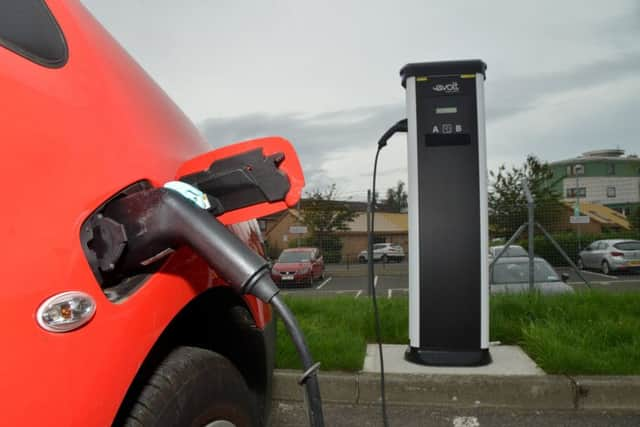Edinburgh set to invest £3.3m in electric car technology
and live on Freeview channel 276
The city council’s Transport and Environment Committee will this Thursday consider approving a business case to roll out improved electric vehicle infrastructure across Edinburgh with a £3.3 million price-tag. The council has applied to Transport Scotland’s Switched On Towns and Cities fund for £2m of funding towards the upgrade.
In order to provide the new charging points, £1.1m will be needed by 2020 and a further £2.2m by 2023 along with substantial annual running costs. The council hopes to generate an estimated £1.3m a year from motorists paying to charge their vehicles. The business case suggests a 20p per kWh fee for all users along with a 30p connection fee for residents and business, £1 for taxis and private hire cars and £2 at park and ride sites.
Advertisement
Hide AdAdvertisement
Hide AdResearch estimates that 7,714 tonnes of carbon will be saved each year once up and running and 14.2 tonnes of NO2 will be removed from the city.


The independent study and business case by the Energy Saving Trust (EST) is the first in Scotland and “puts Edinburgh at the forefront” of electric vehicle work in Scotland, and potentially the UK.
The findings predicts that by 2023, there will be 9,874 residential electric vehicles, 623 electric taxis and 77 plug-in vehicles visiting the city’s park and ride sites each day.
The ambitious plans will see an additional 211 charging points installed by 2023 made up of 111 fast chargers, 23 rapid chargers and 77 slow chargers. By 2020, an extra 69 charging points will be needed in phase one of the project. A total of 68 locations for multiple charging points have been identified across the Capital, to create strategic charging hubs.
Advertisement
Hide AdAdvertisement
Hide AdTransport and environment convener Cllr Lesley Macinnes said: “Edinburgh is in the vanguard of a nationwide drive to improve electric vehicle infrastructure and this business case will help us make great strides towards a greener, healthier Capital.
“Electric vehicles are only part of the solution to worsening air quality, however, alongside the other key elements of our wider sustainable transport agenda such as promoting use of public transport and active travel like walking and cycling.”
There are currently 715 electric vehicles registered by residents of Edinburgh, with around 40 public charge points already installed and registered on the ChargePlace Scotland network.
For the past few years, Dundee has been leading the way for electric vehicles north of the Border. Nine out of the top ten most used rapid chargers in Scotland are in Dundee – where the council owns 62 charging points at 13 locations.
Advertisement
Hide AdAdvertisement
Hide AdEdinburgh has more than 23 per cent of all licensed electric vehicles in Scotland. As of October 2017, there were 89 charging points, including 58 which are publicly available.
The EST report said: “This will provide Edinburgh with a competitive edge, equipping the council with proven and scalable delivery mechanisms for the period beyond 2023 and towards 2032. Through development of the recommendations contained within this report, Edinburgh has an opportunity to be a world leader in the proactive, economically viable enablement of EV infrastructure.”
Emilia Hanna, air pollution campaigner for Friends of the Earth Scotland, said: “Plans for 200 new electric vehicles charging points is good news for the move away from fossil fuelled vehicles. More charging points is great for people who are thinking about buying an electric car but are worried about where they will charge it up.
“Pollution from petrol and diesel fumes is highly damaging to our health so electric cars are part of the solution to Edinburgh’s air pollution, which is breaking safety standards in six areas of the city. However, electric cars will still cause congestion, and are currently only really an option for the very rich. We need fewer vehicles on the roads, not just newer vehicles.”
Advertisement
Hide AdAdvertisement
Hide AdThe council will also investigate whether lampposts could be harnessed to charge vehicles, although this may not be possible. After 2023, the EST recommends the council revisits its infrastructure to take advantage of new technology including wireless charging, ultra-rapid charging and mass energy storage.
Chas Booth, Green transport spokesperson, said: “The council should be setting the pace on electric vehicles, and that means ensuring the charging infrastructure is in place.
“Without reliable, convenient and properly maintained charging points, people simply won’t make the switch to electric. The latest report is welcome, if overdue, but the real test of the council’s commitment will lie in getting the work done and the charging points installed.”
Fears have been raised by power companies that a surge in electric vehicles could put pressure on the grid network - leading to power outages without more investment. The council will liaise with Scottish Power about the potential impact on the grid network if the infrastructure is put in place.
Advertisement
Hide AdAdvertisement
Hide AdGuy Jefferson, customer services director at Scottish Power Energy Networks, said: “We are already working with CEC on how to help Edinburgh plan for the shift to electric transport and will now consider their ambitious proposals for charging infrastructure in the city.
“It is essential that the electricity grid in Edinburgh is prepared for the increase in vehicle chargers. Networks companies like SPEN need the support of the regulator Ofgem, to invest now, ahead of demand to enable cities like Edinburgh decarbonise.”